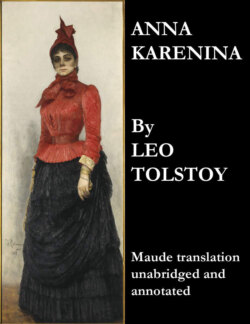Читать книгу Anna Karenina (Maude Translation, Unabridged and Annotated) - Leo Tolstoy - Страница 39
На сайте Литреса книга снята с продажи.
Chapter 32
ОглавлениеTHE first person to meet Anna when she reached home was her son. He ran down the stairs to her regardless of his governess’s cries, and with desperate delight called out: ‘Mama! Mama!’ When he reached her he clung round her neck.
‘I told you it was Mama!’ he shouted to the governess. ‘I knew!’ Her son, like his father, produced on Anna a feeling akin to disappointment. Her fancy had pictured him nicer than he was in reality. She had to come down to reality in order to enjoy him as he was. But even as he was, he was charming, with his fair curls, blue eyes, and plump shapely legs in tight-fitting stockings. Anna experienced an almost physical pleasure in feeling his proximity and his caresses, and a moral solace when she met his simple, trustful, and loving gaze and heard his naïve questions. She unpacked the presents which Dolly’s children had sent him, and told him that there was a girl in Moscow whose name was Tanya, who could read and even teach other children.
‘And am I worse than she?’ asked Serezha.
‘To me, you are the best in the world.’
‘I know,’ he said, smiling.
Before Anna had time to finish her coffee the Countess Lydia Ivanovna was announced. The Countess was a tall, stout woman with a sickly sallow complexion and beautiful, dreamy, black eyes. Anna was fond of her, but to-day she seemed to see her for the first time with all her defects.
‘Well, my dear! did you take the olive branch?’ asked the Countess Lydia Ivanovna as soon as she entered the room.
‘Yes, it’s all over; but the whole affair was not as serious as we thought,’ Anna replied. ‘My sister-in-law is, in general, too impulsive.’
But the Countess, who was interested in everything that did not concern her, had a habit of never listening to what interested her, and she interrupted Anna:
‘Ah, yes! There is much sorrow and evil in the world, and to-day I am terribly worried.’
‘Why! What is the matter?’ asked Anna, trying to suppress a smile.
‘I am getting tired of breaking lances uselessly in the cause of truth, and sometimes I feel quite unstrung. That Little Sisters’ affair’ (this was a philanthropic, religio-patriotic society) ‘was going splendidly, but to work with those gentlemen is impossible,’ continued the Countess Lydia Ivanovna with an ironical air of resignation to fate. ‘They took the idea and perverted it, and are now discussing it in such a trivial, petty way! Two or three, your husband among them, understand the full significance of the affair, but the others just drop it. Yesterday I had a letter from Pravdin… .’
Pravdin was a well-known Panslavist who resided abroad.
The Countess told Anna what he had written.
She then went on to tell her of other unpleasantnesses, and of the underhand opposition to the plan for uniting the Churches, and she went away in a hurry, as she had that afternoon to be at a meeting of another society as well as to attend a Slavonic Committee meeting.
‘This is all just as it was before, but how is it that I never noticed it before?’ said Anna to herself. ‘Or is it that she is specially irritated this morning? But it is really funny; her aim is to do good, she is a Christian, and yet she is always angry and always has enemies — all on account of Christianity and philanthropy!’
After the Countess had left, a friend — a high official’s wife arrived and gave Anna all the Petersburg news. At three she also left, promising to come back to dinner.
Karenin was at the Ministry. Anna, left alone, spent part of the time before dinner in seeing her son have his dinner (he dined apart), in putting her things in order, and in reading and answering the notes and letters that had accumulated on her table.
The feeling of causeless shame she had felt during the journey, and her agitation, had quite vanished. In her accustomed conditions of life she again felt firm and blameless.
She thought with wonder of her state the day before. ‘What had happened? Nothing! Vronsky said some silly things, to which it will be easy to put a stop, and I said what was necessary. It is unnecessary and impossible to speak of it to my husband. To speak of it would be to give it an importance that does not belong to it.’ She remembered how she had once told her husband about one of his subordinates who very nearly made her a declaration, and how Karenin had answered that every woman living in Society was liable to such things, but that he had full confidence in her tact and would never degrade himself and her by being jealous. ‘So there is no need to tell him! Besides, thank Heaven, there is nothing to tell!’ she said to herself.
